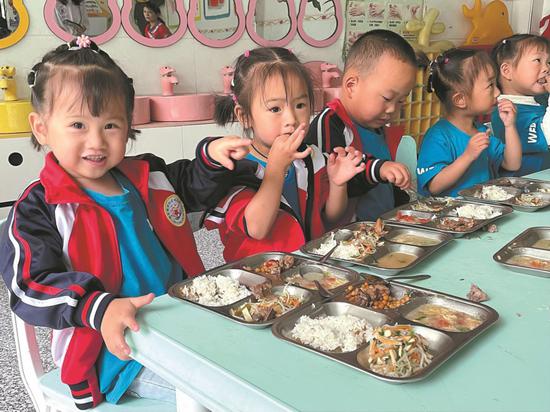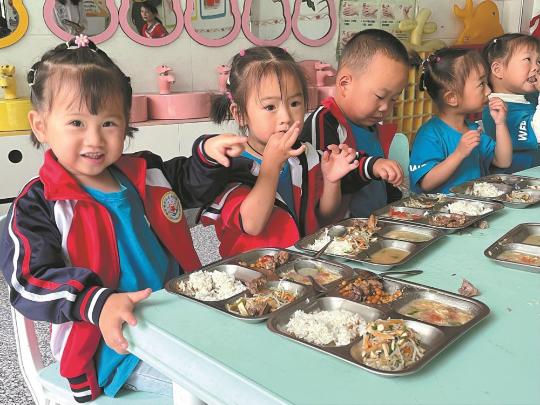Audit report: Mishandling of funds rectified
Misappropriation of meal subsidies for rural students, other issues addressed

Children have their free nutritious lunch at a village kindergarten in Longshan town, Xiangxi, Hunan province, on June 27. (Photo by Yao Yuxin/China Daily)
A total of 1,200 individuals have been held accountable for improperly handling the funds allocated for rural students' meals, according to a report being deliberated by Chinese lawmakers.
After the problem came to light, a rectification process was rolled out across the country, said Hou Kai, auditor-general of the National Audit Office, while delivering for review on Sunday the 2023 audit rectification report to the ongoing session of the Standing Committee of the National People's Congress, China's top legislature.
China's audit authorities usually release the audit work report in the middle of the year, followed by a year-end rectification report addressing the issues identified in the audit.
According to the audit rectification report, 384 people, including members of the school staff and those supervising food suppliers in eight provincial-level regions, have been held accountable for improper handling of the funds.
The report also revealed that 66 counties caught misappropriating 1.95 billion yuan ($268 million) set aside for meals to cover other expenses have returned the money, while one county censured for substandard quality of meals has allocated nearly 730,000 yuan to improve food standards.
Another 121 counties have canceled contracts with 147 unqualified food suppliers, recovering or paying the cumulative fine of 420 million yuan.
The threshold for food providers has been raised, while the inspection of food safety has been strengthened after the rectification, the report said. Furthermore, the supervision of food purchase and bidding has been tightened, with 284 relevant rules or work measures optimized, it added.
"After the problem was exposed in the audit, six central authorities jointly issued guidelines calling for more attention to food safety and stronger supervision on the use of dietary funds in primary and secondary schools," Lin Hai, an official from the National Audit Office, told China Central Television.
Lin added that the audit rectification process, along with the issuance of joint guidelines, aims to ensure that every penny is used to provide nutritious meals for students.
A few other problems involving people's livelihoods, including those related to unemployment insurance and rural construction, have also been rectified, according to the report.
Thirty-seven counties have optimized their drug purchase rules for village clinics, with more training provided for medical personnel in diagnosis and treatment, so that villagers have access to better medical services, it said.
More than 1,500 farmhouses and over 1,700 unsafe rural roads and bridges in 39 counties have been reinforced, while traffic signs have also been installed in these places, the report added.
Hou, the auditor-general, said the problem-rectification process will continue, and individuals or departments that make only perfunctory efforts to fix issues will be held accountable.
In areas where problems occur frequently, auditors will also strengthen their supervision and help improve the work flow in a timely manner, he added.

